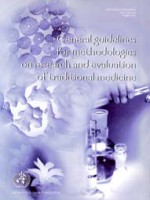General guidelines for methodologies on research and evaluation of traditional medecine
- 2000 - 71 pages - 1 Volumes
- Edition : World Health Organization, Geneva
- Langues : Anglais
- Mot-clés : Médecine traditionnelle, Méthodologie, Plantes médicinales
Description :
During the last decade, use of traditional medicine has expanded globally and has gained popularity. It has not only continued to be used for primary health care of the poor in developing countries, but has also been used in countries where conventional medicine is predominant in the national health care system.
With the tremendous expansion in the use of traditional medicine worldwide, safety and efficacy as well as quality control of herbal medicines and traditional procedure-based therapies have become important concerns for both health authorities and the public.
Various practices of traditional medicine have been developed in different cultures in different regions without a parallel development of international standards and appropriate methods for evaluating traditional medicine.
The challenge now is to ensure that traditional medicine is used properly and to determine how research and evaluation of traditional medicine should be carried out. Governments and researchers, among others, are increasingly requesting WHO to provide standards, technical guidance and information on these issues.
Since 1991, WHO has developed and issued a series of technical guidelines such as Guidelines for the assessment of herbal medicines; Research guidelines for evaluating the safety and efficacy of herbal medicines; and Guidelines for clinical research on acupuncture. However, these guidelines are still not sufficient to cover the many challenging issues in the research and evaluation of traditional medicine.
In 1997, with the support of the National Center of Complementary and Alternative Medicine, National Institutes of Health, Bethesda, MD, USA, a WHO informal discussion developed draft guidelines for methodology on research and evaluation of traditional medicine. Since then, the draft has been revised four times. The guidelines were finalized at a WHO consultation in April 2000, in Hong Kong, China, with the support of the Government of Hong Kong SAR.
The guidelines focus on the current major debates on safety and efficacy of traditional medicine, and are intended to raise and answer some challenging questions concerning the evidence base. They also clarify certain commonly used but unclear definitions. The guidelines present some national regulations for the evaluation of herbal medicine, and also recommend new approaches for carrying out clinical research, for example, using the WHO QOL user manual. The quality of life (QOL) manual was developed by the WHO Programme on Mental Health, and may also be used to evaluate the results of clinical research in traditional medicine.
Although the guidelines have been carefully developed and modified, based on comments received from various experts and national health authorities across the world, there still may be other issues and views that, unintentionally, have General guidelines for methodologies on research and evaluation of traditional medicine not been included. Unfortunately, it is possible that some experts in the field may not have been consulted, due to WHOs limited budget and time for preparation.
There can be no doubt that the guidelines will achieve their purpose of improving the quality and value of research in traditional medicine. It is anticipated that the guidelines will be revised again in the near future, in response to developments in research in traditional medicine. We therefore welcome all comments and views at any time.



